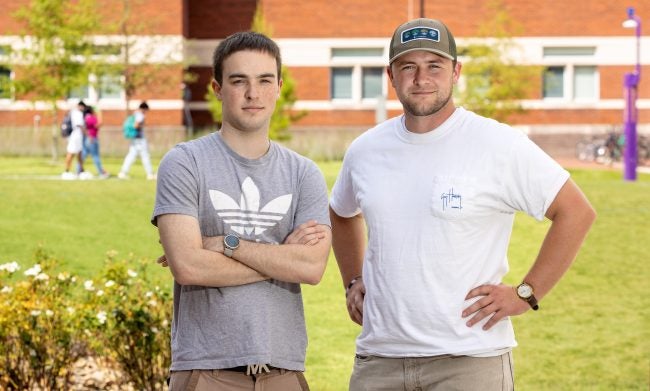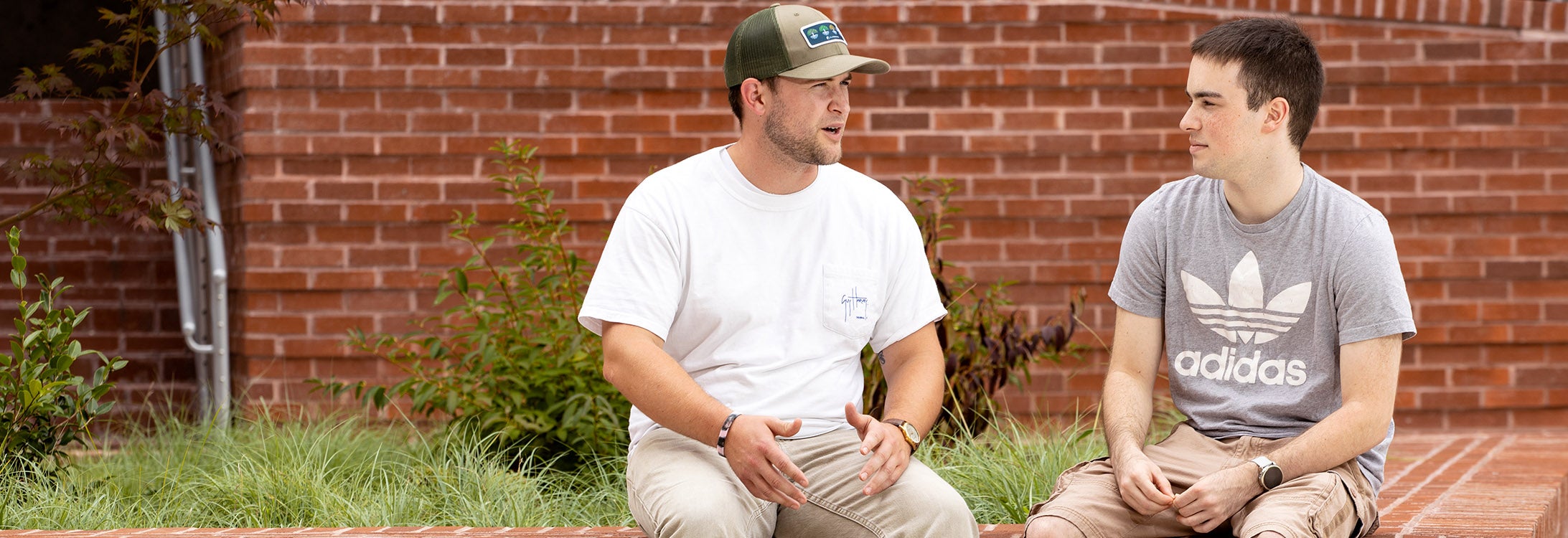SUPPORT AND AWARENESS
ECU Recovery strengthens support network
At East Carolina University, students recovering from substance use disorder are not only receiving support, they’re providing it as well.
Jarmichael Harris, ECU’s Collegiate Recovery Community coordinator, said it’s the students who have made the program stronger than ever going into its fourth year. CRC, also called ECU Recovery, is a family, he said, so the group calls him J.
They have him as an advocate and advisor to navigate university procedures and channels, but many of the initiatives within the community are student led and driven, like the Purple Pantry that gave out 800 pounds of food last semester to help fight food insecurity on campus.
Students like Noah Gould and Jacob Harding are working on new initiatives like a student organization and a regular peer support meeting. Gould said having people to talk to who have faced similar struggles has been an important part of his own recovery, and he wants to help make sure other students know about the resources available on campus.
“People need to know it’s there,” he said. “My freshman year, I didn’t know about it. … It’s really just to know that you’re not alone, that there are other people who have been where you’re at.”

ECU Recovery is designed to provide educational opportunities, personal development, and social enhancement to students in recovery and to the allies who support them.
Harris emphasized that each person’s recovery is an individual experience, with multiple pathways to recovery, but that the CRC provides students with a safe, shared space to grow and to connect with and support each other.
“Our students here at ECU understand that recovery is simultaneously a personal journey and a team sport,” he said. “We support one another by sharing our hope and strength and being a listening ear.”
Harding, who’s now working on a chemistry degree and plans to apply to medical school, said he’s faced homelessness and seen friends pass away due to substance use.
“(The recovery community) has given me everything, really,” he said. “If it hadn’t been for recovery I’d probably be dead, to be honest. I’m going to a funeral tonight for a friend who died from it. I owe my entire life to recovery, so it’s important to give back. You can only keep what you have by giving it away.”
Harding said his substance use started before college, but the transition played a role in his struggle. Coming from a poor, single-parent household, he said he didn’t know how to be an adult.
“Insecurity drives a lot of it,” he said. “You see kids who have more than you, some who have less. It’s just hard to find a place in it, and that really fueled my issues.”
The goal of the CRC is to help students in recovery have an authentic college experience without the substance use that can be all too common on university campuses, Harris said. College can be a challenging time for students, but it’s also a time when they have a lot of support available.
“Collegiate recovery communities really do help students find that support right where they are,” he said. “This is going to be, for most students, four to five years of their life where they have the most resources available to them at once. And they’re able to actually kind of find themselves.”
In 2014, then-Governor Pat McCrory visited ECU to sign an executive order creating a pilot program with an emphasis on substance use prevention and treatment on six UNC System campuses. ECU Recovery opened its doors in 2015.
Harris said the program is about supporting recovery, but also educating the community about the positive impact that those in recovery can have. Both Gould and Harding hope to do just that through their future careers — Harding in the medical field and Gould in criminal justice.
“In eastern North Carolina, the stigma is just so thick … that it’s hard to jump headfirst into (recovery), knowing that you could be jeopardizing your career and things like that by being open about your recovery,” he said. “So what we’re doing with the recovery community is educating the campus and the community about what recovery is, what it isn’t, and how someone in recovery really is an asset to our community here on campus, but also the community at large.”
As the nation struggles with the opioid epidemic, ECU is working to help students feel safe enough to be open about their recovery and create a welcoming environment for themselves and for anyone else who needs that support system. Part of the university’s Center for Counseling and Student Development in Umstead Hall, the program is based on four pillars — recovery, education, wellness and service.
This week, the CRC hosted a screening of “The Anonymous People,” and along with the Pitt County Coalition on Substance Abuse, it will host the Recovery Road 5K on Saturday, Sept. 14 at the Greenville Town Common. For more information or to register, visit https://runsignup.com/Race/NC/Greenville/RecoveryRoad5K.
Visit ECU Recovery for contact information.
“For anyone who may need help, it’s OK to need help,” Harding said. “It doesn’t make you any more or less of anything, and five years from now, your life is either going to be better or it’s going to be worse, so what do you have to lose by showing up for a meeting?”
